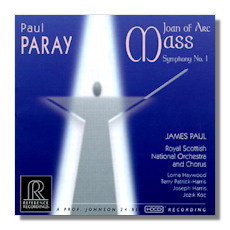
The Internet's Premier Classical Music Source
Related Links
- Paray Reviews
- Latest Reviews
- More Reviews
-
By Composer
-
Collections
DVD & Blu-ray
Books
Concert Reviews
Articles/Interviews
Software
Audio
Search Amazon
Recommended Links
Site News
 CD Review
CD Review
Paul Paray

- Symphony #1 in C Major
- Mass for the 500th Anniversary of the Death of Joan of Arc *
* Lorna Haywood, soprano
* Terry Patrick-Harris, mezzo
* Joseph Harris, tenor
* Jozik Koc, bass-baritone
* Scottish National Chorus/Christopher Bell
Royal Scottish National Orchestra/James Paul
Reference Recordings RR-78CD 65:54 HDCD
This disc was recommended to me by Reference Recordings due to my work with the Detroit Symphony Orchestra, which Paray led for an unquestionably successful decade. Musicians and critics alike have long admired the late maestro for his wide-ranging musical gifts, both on and off the podium. Like fellow conductor Jean Martinon, Paray represented the finest French conducting, with unforced, lively interpretations of a wider range of music than he was given credit for. Like Martinon, he's often pegged as a French music specialist, despite his affinity for both German and Russian classics. Unlike his fellow Frenchman, Paray's American years were largely fruitful and successful.
A final difference is that Martinon's compositions are very French but also somewhat challenging in nature. Paray on the other hand is undoubtedly French too, but his compositions feature the very best of his podium efforts. They are therefore incredibly accessible, adventurous, and exciting. Credit James Paul and the always intelligent folks at Reference Recordings for taking on such an unusual project. In particular, Paul has gone out of his way to express admiration for the elder Paul's body of work, and his insightful and genuine booklet notes add greatly to the programs' sense of tribute.
The Symphony #1 is the first of two works in the medium for Paray. Neither is widely known, and this is apparently the work's first recording since an obscure radio broadcast with the composer conducting. As mentioned above, Paray's compositional and interpretative gifts seem to promise a fine work, and it proves so here. While the influences are clear – you seem to hear echoes of everyone who was anyone in the conductor's heyday – the piece is clearly his own, with the same sense of adventure that can be found in the Mass. No matter who or what you hear, the symphony is worth your time and a welcome addition to any French collection.
The Mass is a different story. Released on CD in the early 90's with Paray's standard-setting rendition ofSaint-Saëns' Organ Symphony, this excellent example of the conductor's art proved more than mere filler. More like a missa brevis in conception, the work is a gorgeous and deeply Romantic utterance that has stood the test of time. That early Mercury recording featured the Detroit Symphony and the composer conducting, and for that reason retains historical interest. It's also finely played and heartfelt. Nevertheless, this newer recording on Reference becomes the favorite if you want more polished choral singing and superior sound. Anyone with an interest in choral music, French music, or even American orchestral history should hear this, and hopefully it also encourages exploration of one of the most underrated recorded legacy's ever set down in Paray's.
Copyright © 2013, Brian Wigman





















